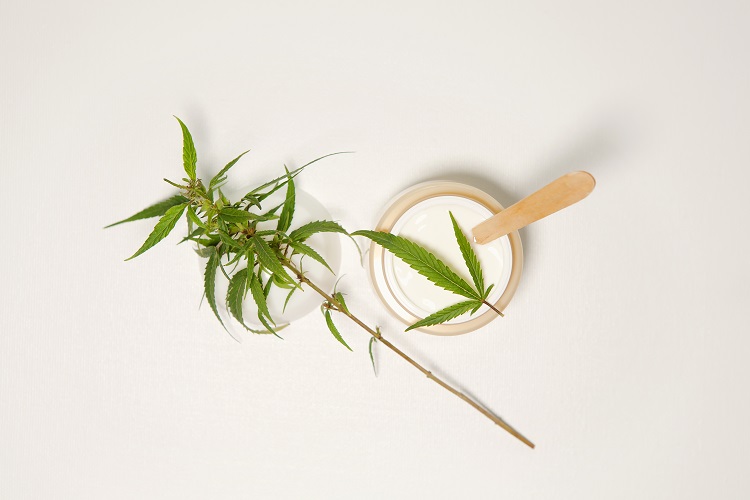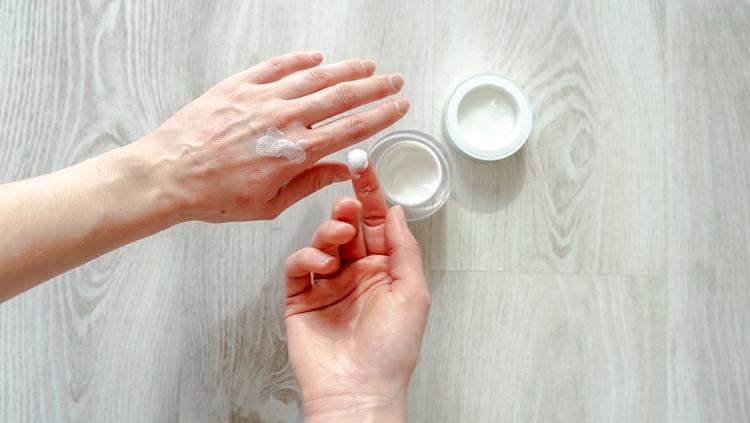Atopic Eczema: What to focus on and how to manage it?
- What is atopic eczema and how does it manifest itself?
- Causes of atopic eczema
- Treatment of atopic eczema
- Atopic eczema and CBD
- What to eat and avoid if you have atopic eczema?
- Atopic eczema and psychosomatics
- How can psychotherapy help with atopic eczema?
- Summary
What is atopic eczema and how does it manifest itself?
Atopic eczema, also known as atopic dermatitis, is a chronic inflammation of the skin. It is a hereditary disease that occurs more frequently in children than in adults, but it is not uncommon for symptoms to persist into adulthood. In some cases, it can suddenly appear in adults who did not have the condition as a child.
The inflammatory rash appears on various parts of the body—the face, neck, hands (wrists), elbows, and behind the knees.
Symptoms may vary slightly from person to person. The most common symptoms include:
- severe itching
- dry, rough, and scaly skin
- redness of the affected areas
- oozing, blisters
- swelling
These symptoms may worsen with stress, temperature changes, contact with allergens, or after eating certain foods.
Causes of atopic eczema
The exact cause of atopic eczema is not fully understood, but it is known that genes, the immune system, and the environment play a significant role.
Possible triggers of atopic eczema:
- Heredity: If atopic eczema (but also hay fever or asthma) occurs in the family, the likelihood of developing atopic eczema in children is higher.
- Immune system disorder: A disorder of the immune system can cause the body to overreact to normal stimuli such as allergens, causing an inflammatory reaction on the skin.
- Breach of the skin barrier: If the protective skin barrier is compromised, the skin loses its ability to retain moisture. This weakened protective layer allows allergens and irritants to penetrate the skin, leading to inflammation.
- Allergens and irritants: Contact with certain substances such as dust, mold, feathers, pets, chemicals, or certain foods can worsen atopic eczema.
- Hormonal changes: Women may experience worse symptoms in the days before menstruation, during menopause, or during pregnancy.
- Emotional factors: Stress, anxiety, and emotional tension can trigger or worsen atopic eczema.
Although the exact causes of atopic eczema are not fully understood, it is important to identify specific triggers for each individual. Treatment and prevention of relapses of atopic eczema can then be more effective.
Treatment of atopic eczema
Atopic eczema is very unpleasant. In addition to persistent itching and sometimes pain, it can also disturb sleep and concentration. Treatment requires time and patience. The basis is moisturizing the skin with emollient creams. Creams and ointments protect against excessive drying and the effects of adverse environmental factors. Apply the cream in a thin layer so that it is absorbed and the skin can breathe. The skin can be moisturized several times a day as needed to keep it supple.
For more severe and acute forms of atopic eczema, corticosteroids prescribed by a doctor are used. Corticosteroid ointments heal inflammation and relieve itching. Corticosteroids do not cure the disease itself, but they alleviate its symptoms. They cannot be used long-term. Antihistamines are also used to reduce itching.
Alternative treatment options include psychotherapy, spa treatments, and phototherapy, which uses ultraviolet light.
If you suffer from atopic eczema, do not use creams containing alcohol, dyes, perfumes, or other chemicals that may irritate the skin. Avoid products and substances that dry out the skin. Shower in lukewarm water rather than hot water and for as short a time as possible. Use mild cleansers and avoid perfumed soaps.

Atopic eczema and CBD
The effects of cannabidiol (CBD) have been studied for many years in connection with inflammation and skin problems. CBD is found in the cannabis plant and is known to interact with specific receptors in the body. These receptors are part of the endocannabinoid system, which influences various physiological functions, including the immune system and inflammatory responses.
Some research suggests that topical treatment with CBD-enriched ointment can significantly improve skin parameters such as hydration and elasticity, as well as eliminate symptoms such as the frequency of breakouts and the size of skin lesions.
A 2019 study followed 20 patients with various skin conditions, including atopic eczema. Participants applied a topical ointment enriched with CBD to the affected areas for 3 months. It was found that CBD can improve skin condition, relieve itching, and facilitate sleep.
What to eat and avoid if you have atopic eczema?
It appears that people who suffer from eczema may also have food allergies or sensitivity to certain foods. Some foods trigger atopic eczema, while others may help improve it.
According to a 2018 survey of 169 respondents, the following foods may trigger atopic inflammation:
- dairy products
- gluten
- alcohol
- sugar
- tomatoes
- citrus fruits
- eggs
- lemonade
- spicy foods
- seafood
Improvements in some cases were achieved by consuming the following foods and dietary supplements:
- probiotics
- vegetables
- fruit
- vitamin C and D supplementation
- dietary supplements – zinc and omega-3 (fish oil)
- cod liver oil and vegetable oils (hemp oil, olive oil, coconut oil)
It is important to remember that the onset and symptoms of atopic eczema are individual and everyone may react differently to a given food. Monitor your reactions to specific foods and consult your doctor if necessary.
Atopic eczema and psychosomatics
It is widely known that the body and soul are closely connected and influence each other. Psychosomatics deals with these connections. Recently, psychosomatics, and especially a specialized field called psychodermatology, has been receiving more attention. The latest research shows close anatomical, physiological, and functional links between the skin and the nervous system, which are already known to be ontogenetically related. These links are reflected in many skin diseases.
The occurrence of atopic dermatitis is often associated with stress. In response to a stressful situation, neuropeptide mediators in the brain, endocrine organs, and peripheral nervous system are upregulated, which directly affects immune and skin cells. The body begins to produce stress hormones such as cortisol. Elevated cortisol levels can disrupt the immune system and lead to inflammation.
Although the mechanism underlying the link between atopic eczema and psychological stress has not yet been fully elucidated, psychoneuroimmunology has provided many new insights that help us better understand that the link between stress and skin disease is significant and undeniable.

How can psychotherapy help with atopic eczema?
Due to the close anatomical and physiological connection between the skin and the psyche, as well as the psychosocial consequences of skin visibility, patients with skin diseases may develop various mental disorders. Available studies report that approximately 25% of all patients with skin diseases show depression, anxiety, or other somatoform reactions.
For these reasons, the treating physician should always take a holistic approach when treating patients with atopic eczema and consider the interdependence of biological, psychological, and social factors when taking a medical history, making a diagnosis, assessing health status, and selecting a therapy.
Psychotherapeutic intervention should be considered, especially in patients who show a marked worsening of symptoms when exposed to stress. Various psychotherapeutic approaches are being investigated and tested. Training programs, such as the AGNES program for children and adolescents up to the age of 18 offered in Germany, have proven to be particularly effective. Training programs are designed not only for treatment but also for tertiary prevention and improving coping skills.
In atopic dermatitis, therapy for managing the itch-scratch cycle and sleep disorders, psychodynamic methods, role-playing, relaxation techniques, autogenic training, Jacobson’s muscle relaxation, and family therapy interventions are also used.
Summary
Atopic eczema, also known as atopic dermatitis, is an unpleasant inflammatory skin disease that manifests itself as red, dry, flaky skin, often with weeping pimples. It is accompanied by severe itching and an urge to scratch, which further aggravates the inflammation. Genetics, the immune system, and the environment play a significant role in the development of atopic eczema. Triggers include various allergens in cosmetics and food, hormonal changes, and stress.
Certain foods, such as alcohol, sugar, or dairy products, can worsen atopic eczema in some individuals, while others, such as vegetables, fruits, and vegetable oils, can improve skin condition. Supplementation with certain vitamins, minerals, or fatty acids may also help.
The treatment of atopic eczema is difficult and lengthy. It is essential to constantly moisturize the skin with emollient creams and ointments. In more severe cases, corticosteroids and antihistamines are prescribed. There are also alternative treatments, such as phototherapy. Research suggests that CBD also has a beneficial effect in the treatment of eczema. CBD-containing ointments can improve skin condition and have the potential to reduce inflammation and itching. When looking for the causes of the onset and worsening of atopic eczema, psychosomatics should not be overlooked. Stress has been shown to disrupt the immune system and can trigger inflammatory processes in the body. In cases of atopic dermatitis associated with psychological difficulties, it is advisable to consider some form of psychotherapy or relaxation techniques.
Author: Michaela Mádlová
Sources:
- The mission of the National Institute of Arthritis and Musculoskeletal and Skin Diseases
- National Library of Medicine
- National Institute of Allergy and Infectious Diseases
- American Academy of Pediatrics
- Pediatric Allergy and Immunology
- Science Direct
Photo: Shutterstock
“All information provided on this website, as well as information provided through this website, is for educational purposes only. None of the information contained herein is intended to be a substitute for a medical diagnosis and should not be considered medical advice or recommended treatment. This website does not endorse, condones or advocate the licit or illicit use of narcotic drugs or psychotropic substances or the commission of any other illegal activity. For more information, please see our Disclaimer .”


